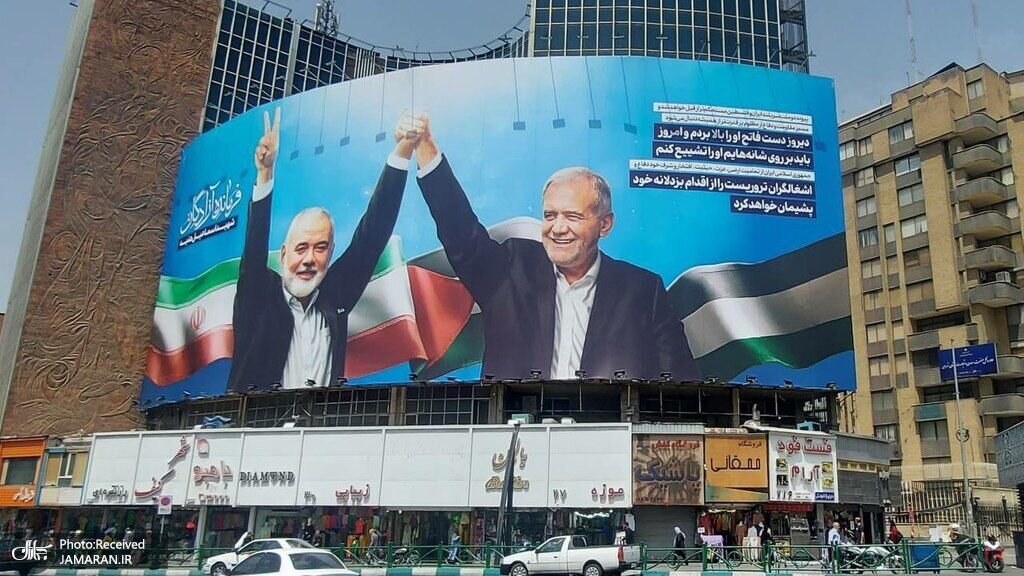Cultural officials, artists express condolences on martyrdom of Ismail Haniyeh

TEHRAN- Iranian cultural figures have reacted to the martyrdom of Ismail Haniyeh, the chief of the political bureau of the Palestinian Resistance Movement Hamas, expressing condolences and condemning the Zionist regime for the treacherous raid.
Haniyeh and one of his bodyguards, who had participated in the swearing-in ceremony of new Iranian President Masoud Pezeshkian in Tehran, were assassinated in their residence in Tehran early on Wednesday.
Expressing his condolences, the Iranian Minister of Culture and Islamic Guidance Mohammad Mehdi Esmaeili quoted a Quranic verse and congratulated Haniyeh’s martyrdom as he died for a righteous cause, ISNA reported.
In another message, Hojatoleslam Mohammad Qomi, head of the Islamic Development Organization, paid tribute to Haniyeh's steadfast commitment to the Palestinian cause, noting his significant role from the First Intifada to his leadership in Hamas. Qomi emphasized that Haniyeh’s martyrdom would not weaken the resistance movement but rather invigorate it.
Hojatoleslam Abdolhossein Khosropanah, secretary of the Supreme Council of the Cultural Revolution, also condemned the assassination and stressed that such actions would not sever the bonds between the Iranian and Palestinian people. He expressed confidence that those responsible would be brought to justice and reaffirmed Iran's commitment to supporting the Palestinian Cause.
Mehdi Ramezani, the Secretary-General of the Iran Public Libraries Foundation, extended his condolences, praising Haniyeh for dedicating his life to the Palestinian Cause and highlighting the impact of his leadership.
The General Culture Council of Iran also released a statement, condemning the assassination and highlighting Haniyeh’s importance to the resistance movement. The council emphasized that such acts of violence only strengthen the determination of freedom fighters worldwide to continue their struggle against oppression.
Iran Book and Literature House issued a message of condolence, describing Haniyeh’s assassination as a crime by the enemies of God and humanity.
Furthermore, several cineastes and artists have reacted to the tragic incident. In separate messages, filmmakers Ebrahim Hatamikia and Davood Mirbagheri, movie producer Mahmoud Razavi, and singer Mohammad Golriz expressed their condolences on Haniyeh’s martyrdom.
On Thursday, concurrent with the funeral ceremony for Haniyeh in Tehran, the latest mural at Valiasr Square was unveiled. It features an image of newly-elected President Masoud Pezeshkian alongside Martyr Haniyeh. It includes a part of the President's speech regarding Haniyeh's martyrdom: “Yesterday, I raised his victorious hand, and today I must carry him on my shoulders. The Islamic Republic of Iran will defend its territorial integrity, dignity, honor, and pride and will make the cowardly occupiers regret their actions.”
Another mural was revealed at Felestin Square in Tehran on Wednesday during a public gathering condemning the assassination of Martyr Ismail Haniyeh. The mural, inscribed in both Hebrew and Persian, carries the slogan “Expect severe punishment” and features a photo of Haniyeh.
Haniyeh was born in exile in 1963 in the central Gaza Strip’s Shati refugee camp. His parents were forcibly displaced by the Israeli military from their home in the town of Asqalan (now known as Ashkelon). This was to make way for Israeli settlers to move into his parents’ house following the Nakba of 1948.
He graduated in 1987 from the Islamic University of Gaza with a degree in Arabic literature and then obtained his Ph.D. from the same university in 2009.
Haniyeh began his activism against Israeli colonialism and occupation with the “Islamic Bloc” which represented the student arm of the Muslim Brotherhood in the Gaza Strip, from which the resistance movement Hamas emerged.
Haniyeh was arrested by the Israeli occupation authorities in 1989 and spent three years in prison. The Israelis then exiled him to Marj al-Zohour on the Lebanese - (Israeli-occupied) Palestinian border along with a group of Hamas leaders.
He returned to the Gaza Strip after being forced to spend a year in exile. Haniyah was appointed as a dean at the Islamic University in the enclave.
In 1997, he was appointed as head of the office of the founder of Hamas, Sheikh Ahmed Yassin. He was elected the chief of Hamas in the Gaza Strip following the assassination of Sheikh Yassin and his successor Dr. Abdel Aziz al-Rantisi in 2004.
In May 2017, Haniyah was elected as the head of the political bureau of Hamas, succeeding Khaled Meshaal, before leaving Gaza for exile in Qatar two years later.
As many as 60 relatives of Haniyah have been killed by the Israeli occupation forces since October 7, 2023. This is while Haniyah was a political leader and not a member of the armed wing of Hamas.
In Israel’s war against Hamas since last October, over 39,000 Palestinians have been killed and more than 90,000 wounded.
SS/SAB
Leave a Comment